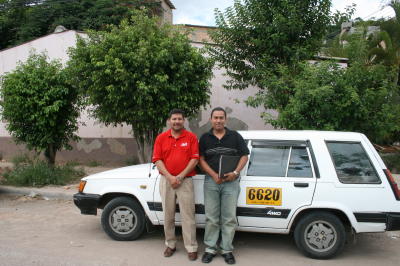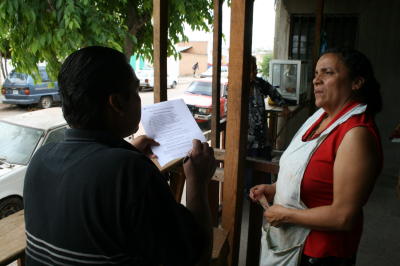
Some of you out there may be wondering what a typical day is like “in the field.” Yesterday was one of those days. I spent the morning driving around with Mario Cruz, one of Prisma´s loan officers.
We zig zag around town, dodging traffic in a 1982 Toyota Corolla disguised as a taxi. Esau, the husband of one of the loan officers, is driving us around town as he usually does. I’m more than happy to take the front seat today, as like most cars here, there are no seat belts in the back. (Although I’m not sure how much a seat belt would help in an accident given that most of the cars I’ve been in here feel as safe as a tin can on wheels!)

Our first stop is to meet Luz Arel Castillo. She runs an auto repair shop. We pull into the shop and I see Luz, the lone female among her four male employees and those at the used car lot next door. I’m sure I look a little surprised to see a woman running an auto repair shop. I asked her how she learned the business. It´s a typical story. Her husband passed away two years ago and she had to take over the business to feed her family. After asking her a few more questions, I finish my interview, and we hop in the car to visit the three other women who are in her lending group.
About 30 minutes later, we arrive in the “Santa Isabel” neighborhood of Tegucigalpa. The last 10 minutes consist of driving on bumpy dirt roads, dodging potholes and rocks at a whopping speed of about 5 miles/hour. Glenda Yamith Duron and Hortencia Diaz Castejon are cousins who share a small house with their respective families. Glenda is married with three children. Hortencia is a single mother also with three children. Each family shares one bedroom amongst the four or five of them. As we sit in the living room, I peer back into the rest of the house. I see a dark room with a dirt floor. It is meant to be the kitchen, but like many families here, they “pay as they go” to build their home, and haven’t been able to afford the kitchen yet. Next door is Thelma Elizabeth Giron. She is also a single mother who lives with her two children. Her “house” consists of one room with two beds, a dresser, a small TV, a sink, and a hot plate. Two of these three women are the sole breadwinners for their family. They make a living by selling products from their home – shampoo, lotion, used clothing, etc. It’s quite incredible to believe that with a $275 loan, these women are able to feed three to four people each. Their income varies week by week depending on how much they can sell. My guess is that on average, they each net no more than $15 a week. Sometimes this job can be depressing. But at the same time, it can be inspiring to see so many people who won’t give up. In one form or another, so many people I meet face hardships and they continue to move forward.
Finally, it’s on to the “Honduras” neighborhood to visit Maria Isabel Obando. I’m pretty impressed to see paved streets and sidewalks, and rows of neatly constructed homes. Maria eagerly invites us in. She starts talking a mile a minute in Spanish, and I’m trying to keep up with all that she is saying, politely nodding my head as if I understand it all! She tells me how much she enjoys working with Prisma because the loan officers give her such personalized attention. (This is something I hear a lot from Prisma clients). As our conversation continues, Maria invites us to stay for lunch. Mario and I look at each other – hmmm….free food? Actually, one of the perks of my job is that most of the clients are so grateful for their loans, that if you try to buy something from them, they usually want to give it to you for free! Some of the foods I’ve tasted made by Kiva borrowers include coconut cookies, corn on the cob, tortillas, and homemade bread. Hey, it’s due diligence, right?

As we finish up our lunch, Maria tells us her neighbor is interested in a loan and she directs us to her business. We head down to the corner and find the potential client in her restaurant where she sells chicken and other local specialties. She wants a loan because she doesn’t have the capital to grow her business. Judging by all the customers she has, we can see that her meals are in demand. Mario walks her through the requirements for obtaining a loan, and promises to return in a few days. Finally, it’s back to the office. But we get stopped again. Another one of Mario’s clients waves us down as we drive by. She has a cousin who wants to apply for a loan for her piñata business. Hmmm…we might see some new Kiva clients soon!















